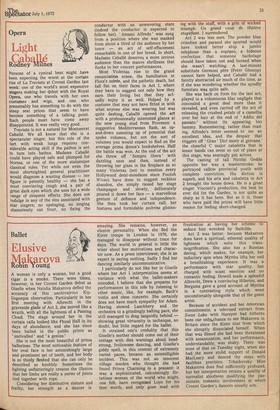Opera
Light
RckieiNtiges Persons of a cynical bent might have been expecting the worst at the curtain rise of La Traviata at Covent Garden last week: one of the world's most expensive singers making her debut with the Royal Opera, one who travels with her own costumes and wigs, and one who presumably has something to do with the steep seat prices that seem to have become something of a talking point. Such people must have come away disappointed. It was really very good.
Traviata is not a natural for Montserrat Caballe. We all know that she is a spectacular singer, but this role of the tart with weak lungs requires considerable acting skill if the pathos is not to turn into bathos. Madame CabeIle could have played safe and plumped for Norma, or one of the more statuesque classical roles. Yet while not even the most shortsighted general practitioner would diagnose a wasting disease — her figure is patently healthy — she has a most convincing cough and a pair of great dark eyes which she uses for a wide range of eloquent effects. She does not indulge in any of the sins associated with star singers; no upstaging, no singing shamelessly out front, no fixing the conductor with an unwavering stare (indeed the conductor is expected to follow her). Amami Alfredo' was sung from a position where she was masked from about a third of the audience by her tenor — an act of self-effacement remarkable in one of her breed. In short, Madame Caballe deserves a more serious audience than the mauve shrillness that flocks to her concert performances.
Most Violettas rise to the grand renunciation scene, the humiliation at Flora's soiree, and the pathetic death, but fall flat on their faces in Act 1, where they have to suggest not only how they earn their living but that they actually enjoy it as well. Helped by a costume that may not have fitted in with what anyone else was wearing but was quite dashing, Caballe opened the act with a professionally interested glance at the new young stud from Provence: a suggestive Mediterranean flash, an upand-down summing up of potential that spoke volumes, but not the sort of volumes you would expect to find on the average prima donna's bookshelves. Half the battle was won. At the end of the act she threw off ' Sempre libera ' with dazzling ease and then, instead of throwing her glass in the fireplace as so many Violettas (not to mention every Hollywood demi-mondaine since Foolish Wives) have done to suggest reckless abandon, she simply raised her stage champagne and slowly, deliberately poured it down her face — a marvellous gesture of defiance and independence. She then took her curtain call, her features and formidable poitrine glisten ing with the stuff, with a grin of wicked triumph. Un grand coup de thddtre stupeflant. I surrendered.
Act 2 was less sure. The powder blue crinoline and parasol she sported would have looked better atop a jumbo telephone than a soprano, a hideous confection that someone backstage should have taken out and burned when she wasn't watching. A last-minute substitute Germont pere (Peter Glossop) cannot have helped, and Caballe had a faintly abstracted air much of the time, as if she was wondering whether the spindly furniture was quite safe.
She was back on form for the last act, played in a voluminous lilac negligee that concealed a great deal more than it revealed, and even carried off the act of releasing the crushed petals of a camellia over her hair at the end of Addio del passato ' without its appearing too hammy. Remembering, rather than reading, Alfredo's letter seemed to me an excellent idea, and the despair that triggers off ' Gran ' Dio! morir si giovane,' the cheerful C major cabaletta that in lesser hands can seem so out of place at this stage, was searingly put across.
The casting of tall Nicolai Gedda opposite her was a masterstroke: he portrayed callow provincial youth with complete conviction. His diction is superb, and his aria and cabaletta in Act 2 brought the house down. He is a great singer. Visconti's production, the best he ever did for the Garden, is not quite as sharp as it has been. But as it is, those who have paid the prices will have little reason for feeling short-changed.






















































 Previous page
Previous page